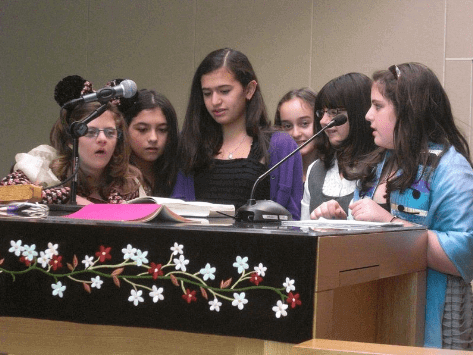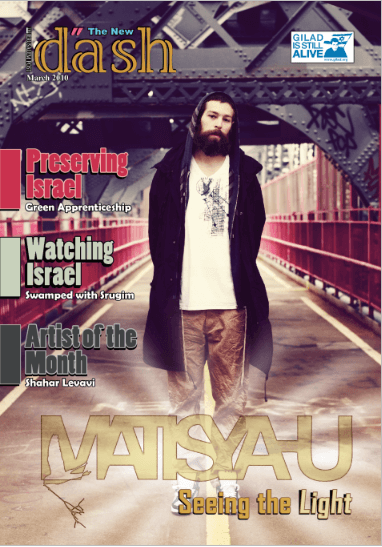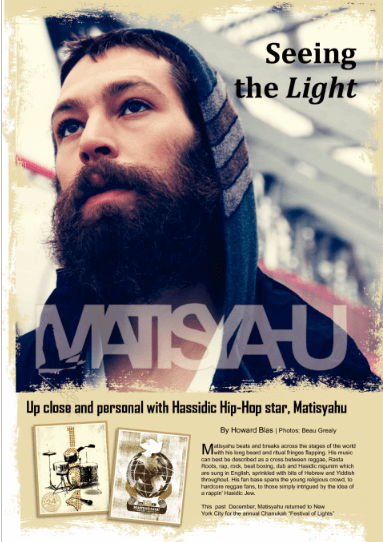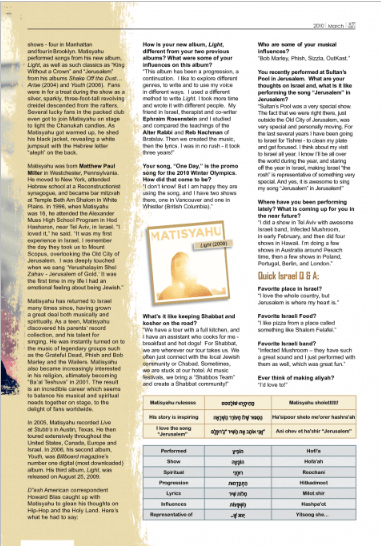The Original
Ilana is a good natured, caring, religiously observant high-school student who enjoys reading, baking hallah with her mother, and spending time with her peers at school and in her synagogue. When it became clear in pre-kindergarten that Ilana had a learning disability, her parents made the difficult decision to transfer her from the local Jewish Day School to a private school that specializes in teaching children with learning issues. Although this was a difficult decision, they knew it was necessary for Ilana’s academic growth and development. They reasoned that Ilana would have plenty of time to socialize with her Jewish friends on Shabbat and on playdates. They knew they could count on her continued involvement in their large Modern Orthodox synagogue.
Ilana’s mother was shocked and disappointed when one mother at their synagogue stopped inviting Ilana to participate in weekly playdates with her child. Invitations to birthday parties and other social activities began to stop as well. Even a B’nei Akiva dinner, designed for children to socialize with other synagogue members, felt “closed” to children who did not attend Day School. Ilana’s mother feels that no attempt was made to facilitate interactions between the Day School students and those from other schools. She finds it ironic that the same synagogue that graciously and compassionately hosts adults with moderate to severe disabilities at its yearly Yachad Shabbaton is unable to successfully include children, such as her daughter, with milder disabilities. She wants genuine acceptance and inclusion—and not compassion or pity. She wonders why some people act as though Ilana is “contagious” and that others can “catch” a learning disability or other impairment by socializing with children with special needs. She laments, “The social isolation is worse than the academic isolation.”
The Jewish tradition has always been aware of differences among God’s creatures, who are all considered to be created in the “image of God.” The Bible and rabbinic texts detail laws about treating people with special needs. We are taught, “Do not curse the deaf or put a stumbling block before the blind,” (Vayikra 19:14), and there is much discussion in various codes regarding the status of the heresh (deaf person), and the shoteh (possibly a developmentally delayed person). Maimonides’ Mishneh Torah (Hilkhot Berakhot, 10:12, based on Berakhot 58b) has a detailed discussion on which berakha to recite upon seeing people who are “different.”And the Mishna in Sanhedrin 4:5 teaches, “Although a person stamps many coins from a single die, and they are all alike—the King of Kings has stamped every person with the die of Adam, yet not one of them is like his fellow man.” These sensitively crafted sources suggest that each person is unique and worthy of respect and inclusion in the community—regardless of appearance or level of ability to walk, speak, hear, or learn. Additionally, these sources suggest that the Jewish community has a moral and even halakhic obligation to create programs to meet the needs of all people within our communities—regardless of special need or circumstance. How accepting and accommodating are our synagogues, schools, and community institutions? What can we do to better include and support those with special needs?
[H1] Synagogues
The synagogue is central to the daily life of most observant Jews—as a Bet Tefilla (a house of prayer), a Bet Midrash (a house of study), and perhaps most importantly, as a Bet Kenesset (a place of gathering). The synagogue is potentially the most important religious institution in the lives of families of children with special needs. Sadly, many families like Ilana’s feel that their synagogues lack a genuinely accepting attitude toward their children. Shabbat morning children’s services and afternoon Shabbat groups are often unable to meet the needs of children with special needs. Many parents feel that their children would benefit greatly from weekly Shabbat services and social activities, even if they sometimes need redirection and gentle reminders from patient, experienced group leaders. Children and their parents often receive uncomfortable looks, “shushing,” and requests to leave the sanctuary when a child is “making noise.” While parents recognize that fellow congregants have a right to pray and listen to the rabbi’s sermon in peace, they are often struck by the lack of understanding in their synagogue. This reception in their own synagogue stands in sharp contrast to the genuine acceptance they receive outside of their own synagogues.
There are Modern Orthodox synagogues and rabbis who have taken the lead in meeting the needs of congregants with special needs. In my work teaching children with special needs for bar and bat mitzvah, several rabbis have suggested sensitive, creative options for members with special needs. For example, families may choose to have a non-Shabbat bar mitzvah, where fewer members would be in attendance, the length of service is shorter, there is no haftarah, and there are no Shabbat-related issues when it comes to microphones, adaptive technology, or computers.
In one Boston area synagogue, a bat-mitzvah girl gave a devar Torah and “announced pages” using Power Point slides during a Sunday morning service. One Modern Orthodox rabbi suggested that a particular child with learning disabilities celebrate his bar mitzvah on the Sunday of Hanukkah because the Torah reading, from Parshat Naso, is repetitive and predictable and therefore less difficult for this child to learn. Another rabbi found a halakhically acceptable way for a non-verbal boy to celebrate his bar mitzvah on Shabbat morning. The boy had a very large brain tumor removed when he was two years old, and has unfortunately never been able to speak. He uses a Dynavox Dynamo augmented communication device seven days a week. He pulls down screens by topic and depresses buttons to communicate his needs. His very dedicated parents worked with the rabbi, so that their son could be called to the Torah on Shabbat morning. He essentially activated his father’s voice to recite the Torah blessing, lead Adon Olam, and deliver a devar Torah.
Despite these success stories, there remain unmet needs for people with disabilities in Modern Orthodox synagogues. Parents express frustration that they do not feel comfortable taking their children with special needs to Shabbat groups or children’s services. Orthodox parents who have made the painful decision to educate their children outsideof the Jewish Day School system feel that such groups and prayer experiences are precisely what their children need to fully experience synagogue and Jewish communal life.
One Modern Orthodox rabbi, a parent of children with special needs, feels uncomfortable bringing his children to his own synagogue; yet, he and his children have been warmly welcomed and embraced “outside” of his community. He feels the neighborhood Hassidishe shtiebel understands and accepts his son—even if he is disruptive during the sermon or the repetition of the amidah. The Conservative Movement’s Ramah camping movement, through its CampYofi Program at Ramah Darom, has been similarly accepting and inclusive. Yofi offers a week-long camp for children with autism and their families. Similarly, Ilana and her family have been warmly embraced by a smaller, more traditional Orthodox synagogue in their neighborhood; each Shabbat afternoon the rabbi and his wife invite Ilana to their home, where she socializes with and even babysits for their children. Modern Orthodox synagogues should similarly embrace differences and work toward accommodating children with special needs.
[H1] Al Pi Darko—According to His or Her Way: Jewish Education for Children with Special Needs
Most parents in the Orthodox community accept as a given that their children will receive a Jewish Day School education. When it comes to providing an appropriate Jewish education for children with special needs, families often find that choices are limited. There are many reasons for this. First, the term “special needs” encompasses diverse impairments, including learning issues, physical disabilities, mental retardation, autism, psychiatric disorders, and other genetic and acquired conditions. Approaches and philosophies toward education, even within the special needs communities, can vary widely—from those advocating full inclusion to those promoting separate classrooms.
A second reason that choices are limited is that schools lack the staffing and expertise to consider implementing special-needs programs. Teachers and therapists with training in special education, speech and language therapy, psychology, physical therapy, and occupational therapy are required to support students with special needs.
Third, schools typically lack the financial resources for starting and running such specialized programs. The costs of providing a Day School education—even for “typical learners”—are never covered by tuition costs alone and can be prohibitive. Dr. Jed Luchow, Director of Special Education/Project SIR for the Board of Jewish Education of Greater New York, notes how complex and expensive providing such services can be. “When public schools need more money for services, they can raise taxes,” remarks Luchow. Yeshivot and Day Schools cannot.
Families specifically seeking a Modern Orthodox approach to educating a child with special needs find that few programs exist. Some turn to Hareidi schools, where there is more general acceptance of all learners who are viewed as created in God’s image. The recent movie, Praying With Lior, portrays the warm acceptance experienced by Lior Liebling, a young man with Down syndrome (and the son of two Reconstructionist rabbis) in a Philadelphia-area Hareidi yeshiva. Modern Orthodox parents of children with special needs have reported similar acceptance by the Hareidi world.
Some families feel that private special-needs schools (and in some cases, even Catholic schools) are better equipped to provide services to children with special needs. In the Northeast, for example, observant families sometimes opt for well-regarded schools such as Churchill and Gateway in Manhattan, Mary McDowell in Brooklyn, Windward in White Plains, New York, Eagle Hill in Greenwich, Connecticut, and the Cardinal Cushing School in Hanover, Massachussetts. This “trade off” means that families need to seek other avenues for providing Jewish education and Jewish socialization environments.
Fortunately, some Jewish community Day School programs do exist for educating children with special needs, and there are some successful initiatives supporting Jewish special education throughout the United States. Although specifically Orthodox-affiliated programs exist, families of children with special needs are more likely to cross denominational lines than they might for their other typically developing children.
Although it is impossible to highlight all such programs, I will mention some programs, mainly in the Northeast, in order to illustrate the various models and approaches currently offered. Many of the descriptions below are provided by the program; ability to live up to their claims are difficult to assess and are beyond the scope of this article.
In 1985, Rabbi Dr. Martin Schloss, currently the director of the Division of Day School Education for the Board of Jewish Education, and Dr. Sara Rubinow Simon founded the Consortium of Special Educators in Central Agencies for Jewish Education. The purpose of this group is to support special education programs in North American Jewish communities as well as to provide resources to Jewish special educators through professional networks. Members meet once a year to share ideas and materials to enhance and expand special education in Jewish educational settings.
Parents for Torah for All Children (PTACH) has supported children with learning differences from elementary school through high school for more than thirty years. PTACH programs exist at such schools as the YeshivaUniversitySchoolfor Girls and Chaim BerlinHigh School. Strides have also been made to sensitize and train teachers. PTACH’s educational director, Dr. Judah Weller, has created the “Jewish Day Schools Attuned Program,” based on the Schools Attuned Program, a nationally recognized professional development and service program, created by Dr. Mel Levine, Director of the Clinical Center for the Study of Development and Learning at the University of North Carolina School of Medicine at Chapel Hill. The Schools Attuned program covers eight neurodevelopmental constructs that affect learning—including attention, memory, language, motor skills, and social cognition. Several years ago, The Nash Family Foundation of New York City funded a grant to train 125 Jewish Day School educators in New York, Los Angeles, and other cities in the Schools Attuned program.
Kulanu Torah Academy in Long Island, New York, is a program dedicated for Jewish students with special needs, including students with Asperger syndrome, autism, cerebral palsy, Down syndrome, dyslexia, and Tourette’s syndrome, as well as developmental disorders, attention disorders, learning disabilities, and physical challenges. Students receive educational services within the yeshiva environment from middle school through high school. In addition, Kulanu’s Gesher Program is a three-year program initiative for 18- to 21-year-old students with special needs, which serves as a “bridge” from school to the world of work.
The Sinai Program in New Jersey offers schools for children with developmental disabilities and learning disabilities. According to their website, Sinai is sometimes referred to as a “school within a school.”Although Sinai is independently operated and funded and each school has its own administration and staff, all of Sinai’s schools are comprised of self-contained classes set within larger, typical community Jewish Day Schools, including the Joseph Kushner Hebrew Academy and Yavneh Academy. This structure increases opportunities for mainstreamingwithin the host schools.
Yeshiva Education for Special Students (YESS!) is the only full-service, professional, special-education yeshiva elementary school in Queens, New York, serving children in grades K through 8 with learning disabilities, attention deficit disorder, and language-processing disorders. According to their website, “It is the philosophy of YESS! that all Jewish children, regardless of their cognitive or physical challenges, have a place in the mainstream of the Jewish community.” YESS! espouses individualized special education for general and Judaic studies. Mainstreaming and integration with the typically developing Yeshiva of Central Queens (YCQ) community are integral to the YESS! program.
Some Modern Orthodox schools have started programs to support students with a range of learning issues. Manhattan Day School in New York City has been offering support services for students in grades 1 through 8 with learning-based language disabilities since 1984. According to Sharon Miller, Director of Special Education, the program provides self-contained classes for between six and eleven students, who learn with one head teacher and one assistant teacher. Students learn basic skills in both secular and Jewish content areas, including reading, writing, mathematics, social studies, science, computers, organizational skills, Hebrew language, Bible, Talmud, and laws and customs. Students with Individual Education Programs (IEPs) often receive in-school services, such as speech and language therapy, occupational therapy, counseling, and physical therapy. The staff also includes special educators and school psychologists.
SAR Academy in Riverdale, New York, offers a program to support elementary and junior high school students with language-based learning disabilities. According to Rebecca Hirschfield, Director of Educational Support Services, the program was started, in part, to help keep students with learning issues in the Jewish Day School system. The SAR program is an inclusive educational initiative, designed to be able to meet the needs of children whose learning needs differ from their typically achieving peers. Children with special needs are placed in “inclusion” classrooms with typically developing children. The class is staffed by an additional teacher, who is a learning specialist. In the high school, students receive support through the Student Learning Center and may participate in a modified program, consisting of fewer periods per week of Talmud and Tanakh, and/or exemption from a foreign language requirement.
Ramaz School in Manhattan offers a Learning Center to support students. In the Lower School, students in need of remediation work individually or in small groups in the Learning Center. In the Middle School, students receive one-on-one remediation during the time they would otherwise be attending specialty classes such as music, art, or parashat haShavua. Students who have completed a formal external psychoeducational evaluation to document a learning disability are eligible for Learning Center services. Upper School students seeking the services of the Learning Center also must undergo psychoeducational evaluation; students may then be eligible for certain accommodations, including extended time for test-taking and laptops for use during exams. Based on the recommendations of the tester, students may also receive remediation from the Learning Center faculty.
A unique Boston-area program, Gateways: Access to Jewish Education, offers several programs for Jewish students with a wide range of special needs. Gateways provides a Jewish education to children with moderate to severe disabilities who are not able to receive one in a typical classroom setting (for example, children with autism spectrum disorder, hearing and visual impairment, developmental delay, cerebral palsy, and/or genetic disorders). Gateways also works with students in Jewish Day Schools across the denominational spectrum, including the Chabad Day School of Sharon, Maimonides School, JCDS, New England Hebrew Academy, Solomon Schechter Day School of Greater Boston, South Area Solomon Schechter Day School, Striar Hebrew Academy (SHAS), The Rashi School, and Torah Academy. Within each Day School, Gateways staff (comprised of speech-language pathologists, occupational therapists, and reading and learning specialists) provide extra support and assistance. Gateways works with students to help improve their academic and social skills and generalizing strategies in the classroom. In addition, the therapists assist teachers with curriculum modifications and provide teachers with professional development, including weekly coaching. For students who need more intensive instruction to develop reading and writing skills, Gateways provides an intensive alternative language arts curriculum to the classroom. This class focuses on explicit teaching of skills, including reading comprehension and decoding, written language, and word study (phonics, spelling, and vocabulary). Rabbi Mendel Lewitin is pleased with what Gateways has accomplished in his Striar Hebrew Academy. “Gateways has sensitized us to the fact that children have unique needs—from enrichment to remediation—and even helped remove the stigma associated with asking for special-educational services. Now, parents are comfortable seeking support, and all students are developing a deeper understanding of their peers.”
Sulam, established in 1998, is the only non-profit Jewish educational organization in the Greater Washington area for children who require specialized services for learning needs. By collaborating with Jewish Day Schools, Sulam educates children with diverse needs alongside their peers in a Jewish Day School setting. Sulam also provides adjunct educational services to high-school students at the Melvin J. Berman Hebrew Academy.
Another non-Day School alternative is MATAN: The Gift of Jewish Learning For Every Child, whose mission is “to give the gift of Jewish learning to every child, regardless of ability.” MATAN provides support to children, teachers, and families through teacher workshops, school consultation, program development, consultation with families, curriculum development and modification, behavior management, community presentations, and neuropsychological assessments. MATAN works with synagogues and provides after-school Talmud Torah-equivalent programs for children with special needs. MATAN also offers teacher training and provides consultation to families and synagogues.
[H1] Youth Groups and Summer Camps
Parents recognize that their child’s Jewish education is comprised of more than the school experience. Opportunities to participate in the richness of Jewish communal and synagogue life are extremely important to a child’s Jewish and social development.
Yachad/National Jewish Council for Disabilities (NJCD) includes individuals with disabilities (ages 8 through senior adult) in Jewish programming across the United States and Canada. Yachad members participate in Shabbatons at various Orthodox synagogues. Yachad Shabbatons are generally staffed by high-school and college-age Orthodox youth, allowing for socialization between typical and disabled peers.
The Jewish Community Center of Manhattan and other Jewish Community Centers across the country offer programs that focus on providing Jewish cultural programming for children and young adults with varying needs. Initiatives include programs for school-age children such as after-school or Sunday programs, summer camps, sibling workshops, assistive technology, lectures and support programs for caregivers, and a Special Needs school fair. The JCC in Manhattan also offers a program for young adults featuring Sunday outings, lounges, drama therapy, technology training, and career development.
The Friendship Circle, founded in 1994 by the Lubavitch Foundation of Michigan—and now existing in many communities nationwide—offers programs to provide assistance and support to the families of children with special needs as well as to individuals and families struggling with addiction, isolation, and other crises. Teen volunteers are an integral part of their program serving individuals with special needs.
According to The Foundation for Jewish Camp, “No experience is more powerful, thrilling, or transformative than Jewish overnight summer camp.” Various Orthodox summer camp programs offer socialization and Jewish immersion experiences for children with special needs. Camp HASC, a summer program of the Hebrew Academy for Special Children, provides a seven-week overnight camping experience to over 300 children with mental and physical handicaps. HASC is specifically dedicated to children with special needs.
Yachad b’Nesher is a Yachad/NJCD program within Camp Nesher, a camp for typically developing children. Yachad b’Nesher specializes in mainstreaming boys and girls who are developmentally disabled. There are accessible bunks on each campus set up for these campers, their special needs, and their specially trained staff. Yachad campers participate daily in all activities with different bunks.
Yachad also offers Yad B’Yad travel programs, where typically developing high school students and members of Yachad together tour the East Coast, the West Coast, or Israel.
The Tikvah Program was founded nearly forty years ago at Camp Ramah in New England and now runs programs at several Ramah camps throughout the United States and Canada. Although Camp Ramah is the camping arm of the Conservative Movement, the Tikvah Program has historically attracted a significant population of its campers from Orthodox homes. In the Tikvah Program, campers are included in all aspects of the rich Jewish summer camping experience and benefit from the richness of “immersion” in Jewish communal life. Prayers are modified for the needs of the campers and generally involve singing, dancing, and repetition. Following spirited weekday morning prayers, campers begin and end breakfast with the appropriate blessings, return to bunks for nikayon (clean up), and participate in daily activities such as Jewish learning, Hebrew instruction, swimming, sports, arts and crafts, and vocational training. Tikvah campers even take a turn leading the camp in Shabbat evening services, and they perform a Jewish-themed play, partially in Hebrew, for the entire camp.
[H1] A Modern Orthodox Action Plan
Clearly, the Modern Orthodox community can do more to help make people with special needs feel more fully included in synagogue and communal life. A move toward full inclusion will require working collaboratively with others in the Jewish community (often across the “denominational divide”), continued education of rabbis, leaders and community members, and ongoing congregation and communal self-assessment.
[H2] Working Collaboratively with Others in the Jewish Community
The Jewish disabilities world has been very successful in breaking down denominational barriers. I heard a story of two Philadelphia-area Jewish parents of children with autism speaking very comfortably and openly—one was a Lubavitch rabbi, and the other was a female Reconstructionist rabbi. The chances of these two interacting in another context are slim. This heartwarming anecdote illustrates the potential for Jews of various backgrounds to work together. Successful collaboration already takes place in many communities across the United States.
In Westchester, New York, Carol Corbin is the chairperson of the Westchester Special Needs Roundtable. She is also the coordinator of Synagogue Inclusion, which is part of the UJA of New York Caring Commission. In the first year of the Roundtable, nearly forty Westchester area rabbis and parents from across the denominations, as well as directors of special-needs programs, JCCs, and various agencies, came together. They determined that the focus of the initial phase of their work should be on teacher training and congregational sensitivity. As their work has continued, the Roundtable has addressed ways to make congregations sensitive to populations with special needs. They have addressed such topics as building access and the social, emotional, and educational needs of those with special needs.
Shelly Christensen, Program Manager for the Jewish Community Inclusion Program for People with Disabilities (a program of Jewish Family and Children’s Service of Minneapolis, Minnesota), is a frequent presenter across the country on the topic of inclusion. Christenson, author of “Jewish Community Guide to Inclusion of People with Disabilities,” has worked with synagogues and agencies to help create awareness and action. Synagogues across the denominations are collaborating in an effort to serve those with special needs, and are taking part in “February 2009 is Jewish Disability Awareness Month.”
Following her presentation several years ago, each synagogue appointed a lay leader to a community liaison committee. Each committee meeting takes place at a different synagogue, and committee members tour different synagogues and discuss issues of accessibility. Christensen reports that members of the Orthodox community have been very involved with the committee, and that synagogues and schools have embraced inclusion. Synagogues of all denominations may wish to consider starting inclusion committees, which function much as social action, Israel action, and ritual committees.
The Modern Orthodox community also has numerous opportunities to join the larger Jewish community in workshops and conferences. For example, the Partnership for Jewish Life and Learning in the Washington, D.C., area has a Department of Special Needs and Disability committee, which organizes a yearly conference, “Opening the Gates of Torah: Including People with Disabilities in the Jewish Community.” Their most recent conference featured twelve sessions on inclusion and attracted more than 350 people. In addition, this organization provides information, resources, consultation, and professional development to parents, teachers, and administrators in preschools, congregational schools, and Day Schools in community. Their extensive range of services strives to “help ensure that every member of the Jewish community, children and adults alike, has access to the range of social, educational, and religious opportunities that the Washington area has to offer.”
Modern Orthodoxy, with its long, impressive history of collaborating with the larger Jewish community, has an unprecedented opportunity to take the lead in the area of inclusion and accommodation of special needs. This willingness to work collaboratively and diplomatically can be useful in helping the community address sensitive issues such as religious and dietary policy in Jewish group residences.
[H2] Education of Rabbis, Leaders, and Community Members
Pulpit rabbis are often sensitive to the diverse needs of their membership. Yet each rabbi can point to the moment he was “sensitized” to the needs of a congregant he hadn’t previously “noticed.” These needs frequently come up when a family is considering the bar or bat mitzvah of a child with learning disabilities or physical disabilities. One rabbi sheepishly recalls being asked if there were any people in his congregation with visual impairments. He reported that he didn’t think so. When asked if his synagogue offered Braille siddurim or special seating for members with visual impairments, he reported that it did not. He was then asked if he felt there was any connection between the lack of accommodations and the lack of attendance by those with visual impairments. And, as noted earlier, parents of children with autism are often uncomfortable bringing their children into the sanctuary for fear they will be disruptive.
While parents are instrumental in educating rabbis, rabbinical seminaries can offer “disability awareness” as part of the rabbinical school curriculum. Rabbi Dov Linzer, Rosh Yeshiva and Dean of Yeshivat Chovevei Torah Rabbinical School in Manhattan, recently brought the entire rabbinical school graduating class to a community-wide inclusion conference, held at the JCC of the Upper West Side of Manhattan. Linzer reports that the education of rabbinical students was encouraged by Shelly and Reuven Cohen, Manhattan residents, who had spent years seeking and developing educational and camp programs for Nathaniel, their son with special needs. When Nathaniel died, the Cohens approached Rabbi Linzer about possibly funding a program in their son’s memory, with the goal of training rabbis about developmental and physical disabilities. This program is now part of every YCT student’s rabbinical education. These rabbis will surely go out to their respective communities more knowledgeable and more sensitive to people with a wide range of special needs.
[H2] Ongoing Congregational and Communal Self-Assessment
Each synagogue has an opportunity and a responsibility to determine whether it is doing enough to meet the needs of people with special needs. This may involve surveying members as to their unique needs and assessing accessibility in their synagogues—from entrances, to the women’s section, to the reader’s desk.
[H1] Conclusion
Meeting the needs of those in our community with special needs involves a sincere belief that all Jews are created beTselem Elokim, and that each person has a right to respect and full inclusion in our communities. The Modern Orthodox community is in a unique position to champion efforts, within our synagogues and within our communities, to expand educational and socialization efforts. It is not our job to complete the task—but neither are we free to desist from it!








